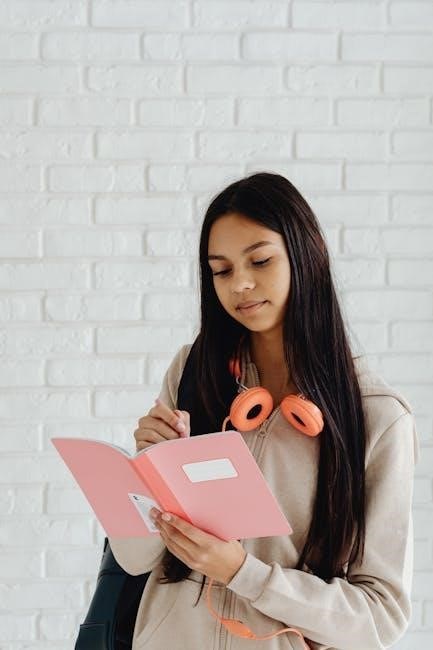Discover how Sean Covey’s 7 Highly Effective Habits empower teens to navigate life’s challenges with confidence, purpose, and resilience, fostering personal growth and long-term success.
Overview of Sean Covey’s Approach
Sean Covey’s approach in The 7 Habits of Highly Effective Teens offers a practical guide tailored for adolescents, focusing on building self-esteem, improving relationships, and navigating teenage challenges. By adapting his father Stephen Covey’s timeless principles, Sean provides relatable stories, real-life examples, and actionable advice. His approach emphasizes personal responsibility, goal-setting, and interpersonal skills, helping teens transition from dependence to independence and interdependence. The habits are designed to foster resilience, empathy, and self-awareness, equipping teens with essential tools for long-term success in academics, relationships, and personal growth.
Importance of Developing Effective Habits in Teenage Years
Teenage years are a critical period for shaping identity and future success. Developing effective habits during this time builds a strong foundation for life, fostering resilience, self-discipline, and confidence. These habits help teens navigate challenges like peer pressure, academic stress, and self-esteem issues, empowering them to make wise decisions. By cultivating proactive behavior, goal-setting, and interpersonal skills, teens can achieve personal growth and build lasting relationships. Investing time in habit formation during adolescence ensures a smoother transition into adulthood, equipping young individuals with the tools to thrive in an ever-changing world.
Habit 1: Be Proactive
Proactive behavior involves taking initiative and accepting responsibility for choices, fostering self-awareness and empowerment. Teens learn to pause, reflect, and respond thoughtfully to life’s challenges and opportunities.
Understanding Proactive Behavior
Proactive behavior is about taking control of your life by making intentional choices rather than reacting impulsively. It involves pausing to think before acting, allowing you to respond thoughtfully to situations. Teens who adopt this habit learn to focus on what they can influence, fostering resilience and personal responsibility. By practicing proactive behavior, young people can build confidence, improve relationships, and create positive outcomes. This mindset encourages teens to step beyond reactive patterns and embrace opportunities for growth and leadership in their daily lives.
Practical Tips for Teens to Take Initiative
Encourage proactive behavior by setting personal goals and taking ownership of actions. Practice mindfulness to pause before reacting, allowing thoughtful responses. Focus on what you can control, like attitudes and efforts, rather than outcomes. Develop a growth mindset, embracing challenges as opportunities to learn. Surround yourself with positive influences that inspire initiative. Celebrate small wins to build confidence and motivation. Teach time management skills to balance responsibilities and leisure. Foster self-awareness to understand strengths and areas for improvement. By taking initiative, teens can cultivate independence, resilience, and a sense of purpose, laying a strong foundation for future success. Empower them to lead by example.

Habit 2: Begin with the End in Mind
Focus on setting clear, long-term goals and creating a personal mission statement to guide decisions, helping teens align actions with their future vision and values.
Setting Long-Term Goals for Success
Setting long-term goals is crucial for teens to create a clear vision of their future. By identifying their passions and aspirations, teens can break down large objectives into smaller, manageable steps. This process fosters accountability and direction, helping them stay focused on what truly matters. A well-defined goal should be specific, measurable, and time-bound, ensuring progress can be tracked. Teens are encouraged to align their daily actions with these goals, fostering a sense of purpose and determination. Regular reflection and adjustment of these goals help maintain clarity and motivation, guiding them toward long-term success and personal fulfillment.
Creating a Personal Mission Statement
A personal mission statement is a powerful tool that helps teens define their purpose and values, guiding their decisions and actions. It is a concise statement that reflects who they are, what they stand for, and what they aim to achieve. By creating this statement, teens can align their daily choices with their long-term goals, fostering clarity and direction. Sean Covey emphasizes that this statement should be personal, meaningful, and inspiring, serving as a roadmap for personal growth and success. It encourages teens to think deeply about their identity and aspirations, helping them stay focused on what truly matters.

Habit 3: Put First Things First
Focus on time management and prioritization to enhance productivity. Use tools like calendars or to-do lists to organize tasks, ensuring a balance between work and rest.
Time Management Strategies for Teens
Effective time management is crucial for teens to balance school, activities, and personal life. Start by prioritizing tasks using a planner or digital app to stay organized. Break larger goals into smaller, manageable steps and focus on one task at a time to avoid multitasking. Set realistic deadlines and allocate specific time blocks for studying, extracurriculars, and relaxation. Learn to say “no” to non-essential commitments and minimize distractions, like limiting screen time. Regularly review and adjust your schedule to ensure it aligns with your priorities and promotes productivity without burnout.
Prioritizing Tasks Effectively
Prioritizing Tasks Effectively
Prioritizing tasks is a cornerstone of effective time management for teens. By focusing on what truly matters, individuals can avoid wasting time on less important activities. Sean Covey suggests using the Eisenhower Matrix, which categorizes tasks into four quadrants: urgent and important, important but not urgent, urgent but not important, and neither urgent nor important. Teens should concentrate on tasks that fall under “important but not urgent,” such as long-term goals or personal growth. This approach helps them avoid procrastination and stay aligned with their priorities. Additionally, breaking tasks into smaller, manageable steps can make them less overwhelming and more achievable.
- Identify critical tasks that align with personal and academic goals.
- Use a planner or digital tools to organize and track progress.
- Learn to say no to non-essential activities that distract from what matters.
By mastering prioritization, teens can achieve a better balance between schoolwork, extracurricular activities, and personal time.

Habit 4: Think Win-Win
Habit 4: Think Win-Win emphasizes seeking solutions where everyone benefits. It fosters mutual respect, collaboration, and positive relationships. By encouraging mutual respect and collaboration, teens build strong, lasting connections.
Building Positive Relationships
Building positive relationships is a cornerstone of personal and social success for teenagers. Sean Covey emphasizes the importance of fostering mutual respect, trust, and communication in interactions with peers, family, and mentors. By adopting a win-win mindset, teens can create meaningful connections that benefit everyone involved. This habit encourages empathy, active listening, and collaboration, helping teenagers navigate conflicts and strengthen their social networks. Positive relationships not only enhance emotional well-being but also provide a supportive foundation for achieving academic and personal goals. Cultivating these skills early helps teens build lifelong, healthy connections in all areas of life.
Encouraging Mutual Respect and Collaboration
Encouraging mutual respect and collaboration helps teens build strong, positive relationships. By valuing others’ perspectives and contributions, they foster trust and cooperation. This mindset promotes win-win outcomes, where everyone feels heard and valued. Teens learn to communicate effectively, resolve conflicts peacefully, and work together toward common goals. Collaboration strengthens teamwork and leadership skills, preparing them for real-world challenges. Mutual respect creates a supportive environment, empowering teens to thrive personally and collectively, while fostering lasting connections and a sense of community. This habit is key to developing emotional intelligence and social harmony.
Habit 5: Seek First to Understand, Then to be Understood
Master active listening and empathy to build deeper connections, fostering mutual understanding and stronger relationships by truly hearing others before expressing your own thoughts clearly and respectfully.
The Power of Active Listening
Active listening is a cornerstone of effective communication, empowering teens to truly understand others before seeking to be understood; By focusing fully on the speaker, avoiding interruptions, and asking clarifying questions, teens can build trust and strengthen relationships. This habit encourages empathy and openness, helping teens navigate conflicts and deepen connections. Sean Covey emphasizes that listening is not just hearing words but understanding emotions and perspectives. Mastery of this skill fosters mutual respect and collaboration, essential for personal growth and harmonious interactions in all areas of life.
Developing Empathy and Communication Skills
Cultivating empathy and strong communication skills is crucial for teens to build meaningful relationships and navigate social challenges. By actively listening and seeking to understand others’ perspectives, teens can foster mutual respect and trust. Habit 5 emphasizes the importance of empathy in resolving conflicts and strengthening connections. Practicing open and honest communication helps teens express their feelings effectively while considering others’, leading to more harmonious interactions. These skills not only enhance personal relationships but also prepare teens for collaborative environments in school and future careers, promoting a win-win mentality and emotional intelligence.
Habit 6: Synergize
Synergize means combining strengths to achieve more together, fostering teamwork and collaboration that leads to greater success and unity in teenage life.
Combining Strengths to Achieve More
Synergy is about valuing diverse perspectives and combining strengths to achieve greater results. By collaborating with others, teens can accomplish more than they could alone, fostering creativity and innovation. This habit encourages teamwork, mutual respect, and open communication. For example, in group projects or sports, synergizing leads to better problem-solving and shared success. It teaches teens to embrace differences and build on each other’s ideas, creating outcomes that exceed individual efforts. This approach not only enhances productivity but also builds stronger, more supportive relationships, preparing teens for real-world challenges where collaboration is key to achieving goals.
Teamwork and Collaboration in Teenage Life
Teamwork and collaboration are vital for teens, fostering mutual respect and shared goals. By combining strengths, teens achieve more together than individually. Synergy encourages open communication, active listening, and valuing diverse perspectives. Teens learn to trust and support each other, enhancing problem-solving and creativity. Collaborative activities, such as group projects or sports, build unity and responsibility. This habit helps teens understand that success is often a collective effort, preparing them for future partnerships and leadership roles. Embracing teamwork cultivates empathy and cooperation, essential for personal and professional growth in an interconnected world.

Habit 7: Sharpen the Saw
Habit 7: Sharpen the Saw emphasizes self-care and personal renewal, encouraging teens to maintain physical, emotional, and spiritual balance for sustained growth and well-being.
Self-Care and Personal Renewal
Self-care and personal renewal are essential for maintaining physical, emotional, and spiritual balance. This habit encourages teens to prioritize activities that rejuvenate their mind, body, and soul. By practicing daily self-care, such as exercise, reflection, and connecting with nature, teens can build resilience and sustain energy. Regular renewal helps prevent burnout and fosters a positive mindset, enabling them to stay focused and motivated. Sean Covey emphasizes the importance of balancing school, relationships, and personal growth through consistent self-care practices, ensuring overall well-being and long-term success.
Maintaining Physical, Emotional, and Spiritual Balance
Maintaining balance is crucial for teens to thrive. This involves nurturing physical health through exercise and nutrition, emotional well-being by practicing mindfulness and managing stress, and spiritual growth by connecting with personal values and beliefs. Regular reflection, healthy habits, and meaningful relationships help sustain this balance. Neglecting any area can lead to burnout or unhappiness. By prioritizing self-care, teens can enhance their energy, focus, and resilience, ensuring they are prepared to handle life’s challenges effectively while cultivating a holistic sense of well-being.
